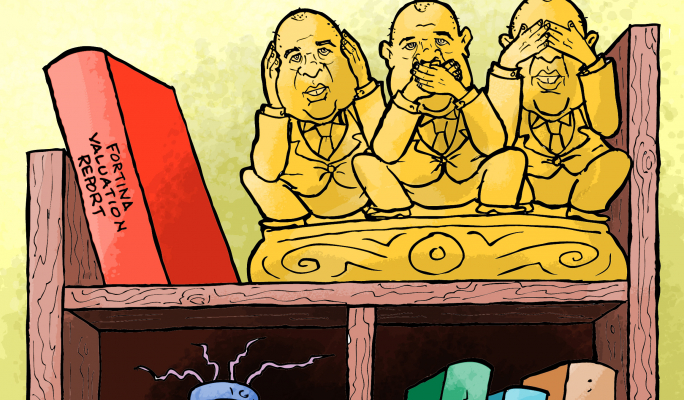By Mikiel Galea
Copyright maltatoday

The National Audit Office investigation into the lifting of Fortina’s land restrictions in 2019 is yet another reminder of the systemic problems that hound Malta’s public institutions.
The NAO probe shows how public institutions have a problem with transparency and accountability, which acts as a convenient cover-up for wrongdoing.
For starters, it is inexplicable how a valuation report commissioned by the Lands Authority that set compensation at a maximum €23.9 million was kept hidden from everyone. Despite being referenced in board minutes, the report was never disclosed, let alone discussed. Officially, the valuation report remained a works in progress, even though it was concluded and presented to the authority’s chair a month after commissioning. And yet, no one bothered to ask about it.
Unfortunately, the ex-judge who kept the report to himself—Lino Farrugia Sacco—and even lied to authority board members, is no longer here to state his case. We will never know what crossed Farrugia Sacco’s mind to partake in the efforts to conceal a report that valued the lifting of restrictions at a whopping €16 million more than what Fortina ended up paying.
But one other person identified in the NAO investigation is around to answer for his behaviour. Keith Schembri, the highest non-elected official in Joseph Muscat’s administration, knew about the higher valuation but was part of the efforts to conceal the report, according to the NAO.
Whether Schembri acted of his own volition or had the blessing of Joseph Muscat is immaterial. Schembri was Muscat’s most trusted person. Schembri’s omnipresence at the heart of every scandal from the Muscat era makes it impossible to fathom that the former prime minister knew nothing about his shady dealings. But the mere fact that the former prime minister had decided to keep Schembri on board after the Panama Papers scandal erupted and afterwards when it became known that 17 Black was owned by Yorgen Fenech, makes Muscat as culpable for Schembri’s sins.
A criminal investigation is required to get to the root of the problem. The police complaint filed by Fondazione Falcone’s Malta branch led by Robert Aquilina, and lawyer Jason Azzopardi, in line with the new requirements introduced this year to ask for a magisterial inquiry, was a welcome move. If the police register no progress over the next six months, or do nothing about the complaint, the complainants can go to court to ask for a magisterial inquiry.
But the Fortina investigation reveals much about the lack of accountability and transparency in government that transcends the mere facts that emerged in this particular case. The Fortina Group is not the only private company that has, over the years and over different administrations, benefitted from government’s ‘generosity’ when it comes to the disposal and lease of public land or the changing of deed conditions. It will not be the last, either.
Malta requires a bi-partisan effort to enact laws and mechanisms that strengthen transparency and accountability.
To start with, we need a proper political party financing law with an overseeing body that has the teeth to enforce existing legal provisions. Today, we have a law that is simply a paper tiger. After this is done, we need a mature debate on state financing of political parties tied to the number of votes obtained in a general election.
But we need other structural reforms: Independent valuations for all deals involving public land should be published and the parliamentary committee that evaluates these deals will be barred from proceeding unless the documentation is published; a land and concession portal where people have access to deeds, valuations, beneficial ownership certificates, and conditions tied to the sale or lease; a statutory lobbying register accompanied with a register of meetings and gifts for MPs, ministers and top government officials, to shed light on who meets whom and why; a mandatory conflict of interest recusal log for all government agencies; a publicly accessible portal where the declarations of assets, interests and income for MPs and ministers can be scrutinised; give the NAO powers to impose sanctions against officials who suppress and withhold information.
With goodwill from all sides these structural changes can be introduced to ensure better governance and reduce the risk of wrongdoing and corruption.
Above all we need honest people in positions of power; the one thing no legislation can impose. However, human frailty can be mitigated by ensuring that the mechanisms to prevent, identify, stop and prosecute wrongdoing are in place and working effectively and efficiently. It’s the least we expect in a country that believes in justice and fairness.



